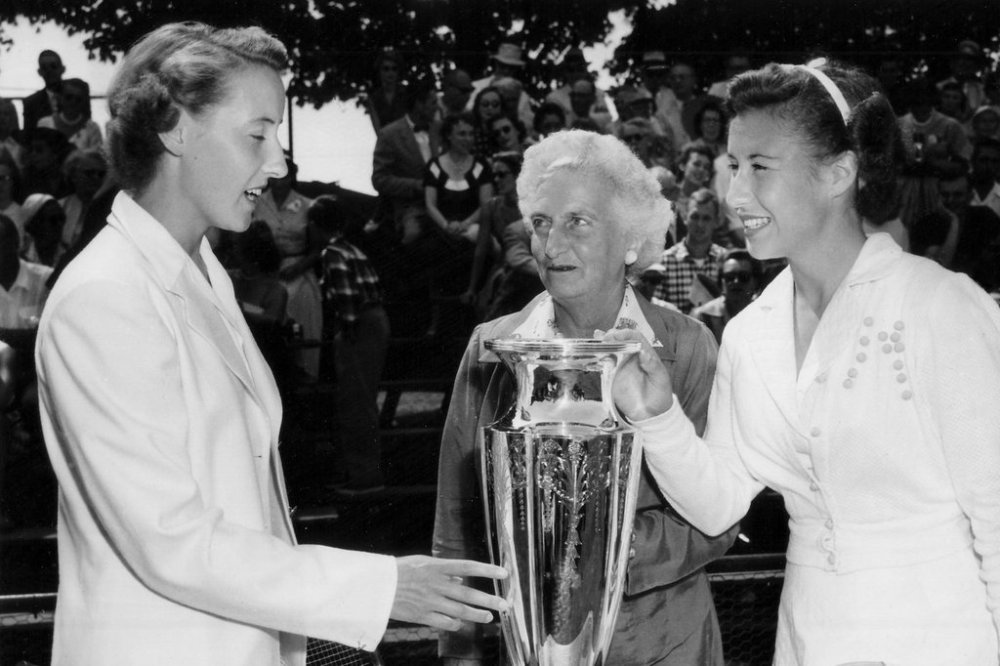Angela Mortimer Barrett, former Wimbledon champion, has died at 93
Advertisement
Read this article for free:
or
Already have an account? Log in here »
To continue reading, please subscribe:
Monthly Digital Subscription
$0 for the first 4 weeks*
- Enjoy unlimited reading on winnipegfreepress.com
- Read the E-Edition, our digital replica newspaper
- Access News Break, our award-winning app
- Play interactive puzzles
*No charge for 4 weeks then price increases to the regular rate of $19.00 plus GST every four weeks. Offer available to new and qualified returning subscribers only. Cancel any time.
Monthly Digital Subscription
$4.75/week*
- Enjoy unlimited reading on winnipegfreepress.com
- Read the E-Edition, our digital replica newspaper
- Access News Break, our award-winning app
- Play interactive puzzles
*Billed as $19 plus GST every four weeks. Cancel any time.
To continue reading, please subscribe:
Add Free Press access to your Brandon Sun subscription for only an additional
$1 for the first 4 weeks*
*Your next subscription payment will increase by $1.00 and you will be charged $16.99 plus GST for four weeks. After four weeks, your payment will increase to $23.99 plus GST every four weeks.
Read unlimited articles for free today:
or
Already have an account? Log in here »
LONDON (AP) — Angela Mortimer Barrett, who overcame partial deafness and an intestinal infection to win three Grand Slam singles titles including 1961 Wimbledon, died on Monday at age 93.
The All England Club made the announcement.
“We are deeply saddened to learn of the death of Angela Mortimer Barrett, Wimbledon’s oldest surviving ladies’ singles champion,” club chair Deborah Jevans said.

A late bloomer to tennis at 14, Mortimer Barrett was ready to play the Grand Slam events by 19 and won her first major title at the 1955 French Championships, beating Dorothy Knode of the U.S. 2-6, 7-5, 10-8 in the final. At 8-8 in the last set, she said she knew she was going to win when she heard Knode ask for a brandy.
By then, Mortimer Barrett’s hearing was failing. Being able to hear the ball coming off the strings is a major aid to most.
“I could hear the applause of the crowd but not much else,” Mortimer told the International Tennis Hall of Fame website. “It helped me concentrate, shutting out distractions. When I hear players say they need to hear the ball, I smile. I couldn’t.”
She returned to the French final in 1956 but lost to Althea Gibson.
Recurring bouts of illness were eventually diagnosed as entomoebic dysentry. She cured it with a three-week starvation diet but lost a lot of weight that made her weak.
Mortimer Barrett’s comeback included her only trip to Australia in 1958, when she won her second Grand Slam singles title, beating fellow Brit Lorraine Coghlan 6-3, 6-4 in the final, and also reached the finals of the doubles and mixed doubles.
Later that year, she got to her first Wimbledon final unseeded — only five women have done so — but lost to Gibson.
Against the odds, again, she advanced to the 1961 final. She upset top-seeded Sandra Reynolds of South Africa 11-9, 6-3 in the semifinals. In the first all-British final since 1914, Christine Truman led 6-4, 4-3 but fell and lost momentum. Mortimer Barrett ground out a 4-6, 6-4, 7-5 victory.
Two months later, she reached the semifinals of the U.S. Championships, her best finish at that event. It was the only year she reached No. 1.
She also won the 1955 Wimbledon doubles title with Anne Shilcock.
Mortimer Barrett was inducted into the International Hall of Fame in 1993, followed by her husband John Barrett in 2014. The only other married couple in the Hall is Steffi Graf and Andre Agassi.
___
AP tennis: https://apnews.com/hub/tennis


